 |
|

|
 |
TABLE of CONTENTS
|
Statewide storms cause flooding on several highways |
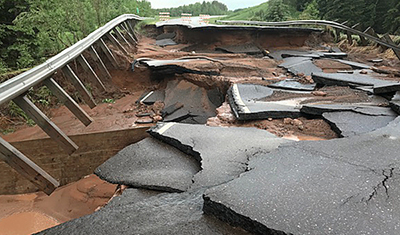
Hwy 23 at the Nemadji River crossing has been closed since June 17 due to flood damage. An emergency repair contract is underway and the highway will be open by July 7. Photo by Chris Cheney |
Persistent rain in June caused flooding across the state and sent maintenance crews scrambling to close roads and set up detours, including at several locations along the Minnesota River. Many roads remain closed.
On June 26, MnDOT closed Hwy 41 between Hwy 169 near Shakopee and Chaska Boulevard in Chaska due to the rising water levels of the Minnesota River. The highway will remain closed until the water recedes and any damage to the road can be repaired.
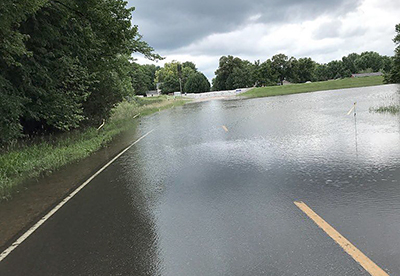
The Minnesota River flooded Hwy 93 near the south edge of Henderson, requiring MnDOT to close the highway June 24. Photo by Jed Falgren |
MnDOT also closed several highways in District 7 due to Minnesota River flooding, including Hwy 93 from Hwy 169 to Le Sueur as well as Hwy 19 east of Henderson and Hwy 93 from Hwy 169 to Henderson.
A storm that hit northeastern Minnesota June 17 required MnDOT to close a portion of Hwy 23 at the south fork of the Nemadji River in District 1 after flooding caused extensive damage to the road. An emergency repair contract for it is currently underway. Work at the site is expected to be completed by July 7. These repairs will provide a temporary gravel driving surface until MnDOT can pave the highway in fall 2018. |
 |
|

|
 |
TABLE of CONTENTS
 |
Hwy 10 is undergoing some updates in Elk River, Big Lake, Clear Lake |
By Rich Kemp
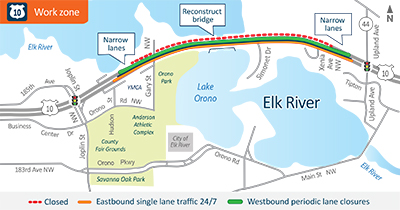
Hwy 10 bridge over Lake Orono and the road surfacing project will be complete in the fall 2018. |
There are two projects underway to improve Hwy 10 north of the Twin Cities Metro area in District 3.
The first one, in Elk River, started in July 2017. The project will reconstruct the Hwy 10 bridge over Lake Orono and the road surface between Joplin Street/185th Avenue and Xenia Avenue. The work includes:
- Replacing the Hwy 10 bridge over Lake Orono
- Reconstructing the Hwy 10 lanes from Joplin Street to Xenia Avenue
- Upgrading the signal system and make intersection improvements at Hwy 10/Joplin Street NW/185th Avenue
- Installing a multiuse trail for a future trail connection
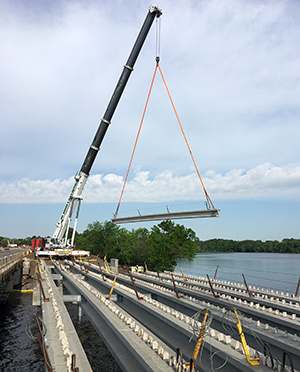
Crews work on the Lake Orono bridge in Elk River. Photo by Tim Paul |
The new bridge’s multipurpose trail will be separated from higher-speed traffic by a concrete barrier for improved access and safety. The trail will be installed along eastbound Hwy 10 (west side). The city of Elk River will install trail connections in 2020 or 2021. When complete, that trail will connect downtown Elk River to Orono Park playground, sports and recreation area.
“The Hwy 10 Lake Orono project has gone extremely well considering the heavy traffic volumes and tight working conditions,” said Tim Paul, construction project manager. “Aggressive scheduling, a clear communication plan and a positive team effort between the contractors and MnDOT are some of the contributing factors to the project’s success.”
Completion of the project is scheduled for fall 2018. More information about the $9.8 million project can be found on the project website.
The second Hwy 10 project is between Clear Lake and Big Lake. The $7 million project began June 4 and will reconstruct the eastbound Hwy 10 road surface from Clear Lake to Big Lake. It will also improve the access at Hwy 10 and County Road 23/Sherburne Avenue with a new reduced conflict intersection in Becker.
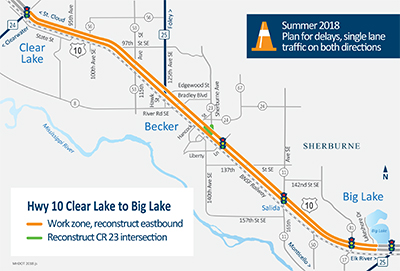
The Hwy 10 Clear Lake to Big Lake project will be complete in October. |
Hwy 10 will be reduced to a single lane with reduced speeds, lane shifts and use of narrow temporary lanes until completed in October.
In addition to the resurfacing, the project will:
- Extend turn lanes
- Repair underground drainage pipes
- Improve pedestrian accessibility at intersections
- Replace old or obsolete road signs
To get more information, check out the Hwy 10 – Clear Lake to Big Lake project website.
|
 |
|

|
 |
TABLE of CONTENTS
 |
MnDOT urges motorists to use emergency notification system signs at railroad crossings |
|
By Sue Roe
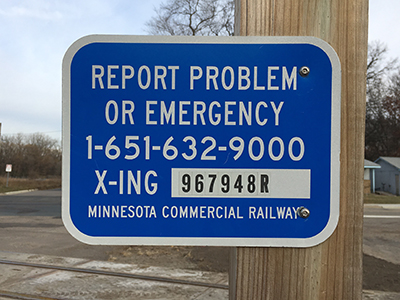
These emergency notification system signs are posted at every public railroad crossing in the state. Motorists should call the number on the sign to report an emergency or problem at the rail grade crossing. Photo by Jim Weatherhead |
Motorists are reminded to use railroad emergency notification system signs when there is a safety issue or emergency situation at a rail grade crossing.
The blue and white signs are posted near the crossing on both sides of the road and should be clearly visible to the road user. The emergency notification system sign includes the railroad’s emergency contact number and the U.S. Department of Transportation’s national crossing number, which identifies the exact location of the crossing to the railroads.
“The seven-number and letter crossing code and the railroad phone number are the only two things a motorist needs to know when reporting an issue,” said Jim Weatherhead, state rail program coordinator. “Motorists don’t need to know the name of the street or railroad.”
He said motorists can call the phone number listed on the sign to report emergency or dangerous situations such a signal malfunction, if someone or something is on the tracks or if the crossing is blocked for more than 10 minutes.
“The railroad can dispatch their own people or law enforcement. There might be times the railroad isn’t aware that a signal is malfunctioning or that an emergency or dangerous situation exists, so calling the number on the blue and white sign is the quickest way to contact the railroad or to reach emergency responders,” Weatherhead said.
The Federal Railroad Administration requires each railroad to have emergency notification system signs at all public crossings. |
 |
|

|
 |
TABLE of CONTENTS
 |
Public Engagement Peer Exchange provides shared learning platform |
By Jeanne Aamodt, Public Engagement program manager
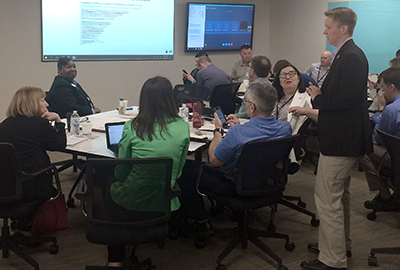
Kjensmo Walker, public engagement analyst, led a Mentimeter exercise during the Public Engagement Peer Exchange to have the group rank and decide on what issues to take up. Photo by Jeanne Aamodt |
Transportation representatives from Florida, Illinois, Oregon and Vermont joined MnDOT in St. Paul June 12-13 for a Public Engagement Peer Exchange aimed at improving public engagement during the highway project development process.
The event was sponsored by the Federal Highway Administration, Minnesota Division, and hosted by MnDOT as a way to address the jointly defined risk: "If customer engagement during scoping is improved, then the customer needs can be understood to help design projects and build public trust."
State spotlights included Florida’s guidance for project managers that aligns public engagement and outreach practices in each phase of project development; Illinois’ use of “dry runs” to prepare project management and staff for public meetings and community gatherings; Oregon’s approach to engaging with underserved communities that emphasizes early contact and paid contracts with community liaisons; and Vermont’s practice of forming community partnerships before projects begin to garner support, expedite project delivery and increase public satisfaction.
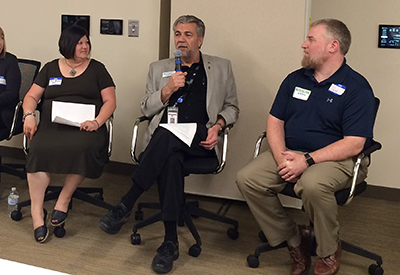
The peer panel discussion on district and CO public engagement perspectives included (from left) Shelli Romero, Oregon; Jeff Vlaminck, Minnesota (District 6); and Pete McGilvray, Florida. Photo by Jeanne Aamodt |
MnDOT spotlights included District 4’s approach to engagement before projects are identified and Metro District’s engagement process and plan for the Rethinking I-94 project.
Participants included district and Central Office staff representing MnDOT leadership, project management, maintenance, planning, public engagement and public affairs. More MnDOT staff were able to join in the peer exchange using Skype technology.
“The Peer Exchange provided much insight into challenges other states face based on their governmental structure, state statutes, demographics, local politics and more. We have similar challenges here in Minnesota and I found value in learning about tools and approaches other states use for public engagement – and which of these have provided measurable success in various situations,” said Nancy Daubenberger, assistant commissioner, Engineering Services Division.
According to Arlene Kocher, FHWA Minnesota Division administrator, FHWA and MnDOT together will consider next steps and follow-up action items.
"The Peer Exchange is one of several response strategies designed to address the public engagement risk. Others include incorporating public engagement into project schedules, including public engagement guidance in the Highway Project Development Process and consideration of Federal Civil Rights Title VI laws in project development," said Kocher.
Materials from the Public Engagement Peer Exchange, including the agenda and individual DOT presentations, are available on the Public Engagement iHUB site.
FHWA's Project Completion Report on the peer exchange will be shared during the monthly MnDOT Public Engagement Skype Meeting on July 12. Contact Kjensmo Walker in the Public Engagement and Constituent Service Office for more information or a meeting invitation. |
 |
|

|
 |
TABLE of CONTENTS
 |
District 7's Mike Smith eligible for vacation donation |

Mike Smith, District 7, is eligible for the vacation donation program. Photo courtesy of District 7 |
Mike Smith, transportation materials technician in District 7, is eligible for the vacation donation program.
Smith has worked for MnDOT since May 4, 2011, in the Mankato Inventory Center. He is married and has a five-year-old son.
He has been diagnosed with C3 glomerulonephritis, a rare autoimmune disease that has led to Stage 3 chronic kidney failure and is a progressive terminal disease. He has also been diagnosed with idiopathic peripheral neuropathy which will lead to permanent nerve death. Due to these conditions, Smith has exhausted all of his sick and vacation leave accruals.
Also eligible for the vacation donation program are MnDOT employees Chade Trupe, transportation materials technician in District 6; Tom Brown, transportation generalist in District 2; Donald Obernolte, Office of Environmental Stewardship; Patty Johnson, District 3 maintenance; Kyle Goosman, District 8 transportation generalist senior; Racheal Glancy, Project Delivery Division; Melissa Janzen, Office of Land Management; and Tim Gilder, Metro District maintenance supervisor.
To donate vacation hours, go to the Employee Self Service Web site and click “Other Payroll” and then “Leave Donations.” The site also allows employees to view a list of all state employees eligible for the program and to enroll as a recipient. |
 |
|

|
|

|
|

|
|

|
|
| |
|



